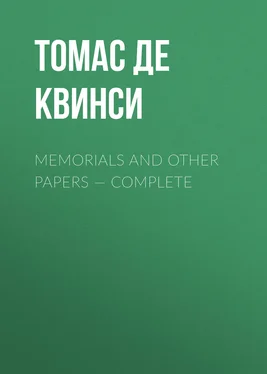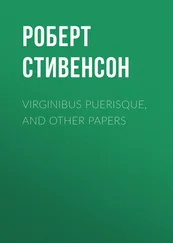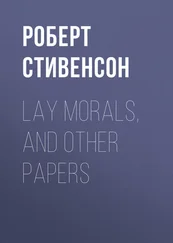Томас Де Квинси - Memorials and Other Papers — Complete
Здесь есть возможность читать онлайн «Томас Де Квинси - Memorials and Other Papers — Complete» — ознакомительный отрывок электронной книги совершенно бесплатно, а после прочтения отрывка купить полную версию. В некоторых случаях можно слушать аудио, скачать через торрент в формате fb2 и присутствует краткое содержание. Жанр: foreign_prose, literature_19, foreign_antique, на английском языке. Описание произведения, (предисловие) а так же отзывы посетителей доступны на портале библиотеки ЛибКат.
- Название:Memorials and Other Papers — Complete
- Автор:
- Жанр:
- Год:неизвестен
- ISBN:нет данных
- Рейтинг книги:5 / 5. Голосов: 1
-
Избранное:Добавить в избранное
- Отзывы:
-
Ваша оценка:
- 100
- 1
- 2
- 3
- 4
- 5
Memorials and Other Papers — Complete: краткое содержание, описание и аннотация
Предлагаем к чтению аннотацию, описание, краткое содержание или предисловие (зависит от того, что написал сам автор книги «Memorials and Other Papers — Complete»). Если вы не нашли необходимую информацию о книге — напишите в комментариях, мы постараемся отыскать её.
Memorials and Other Papers — Complete — читать онлайн ознакомительный отрывок
Ниже представлен текст книги, разбитый по страницам. Система сохранения места последней прочитанной страницы, позволяет с удобством читать онлайн бесплатно книгу «Memorials and Other Papers — Complete», без необходимости каждый раз заново искать на чём Вы остановились. Поставьте закладку, и сможете в любой момент перейти на страницу, на которой закончили чтение.
Интервал:
Закладка:
Oxford, ancient mother! hoary with ancestral honors, time-honored, and, haply, it may be, time-shattered power—I owe thee nothing! Of thy vast riches I took not a shilling, though living amongst multitudes who owed to thee their daily bread. Not the less I owe thee justice; for that is a universal debt. And at this moment, when I see thee called to thy audit by unjust and malicious accusers—men with the hearts of inquisitors and the purposes of robbers—I feel towards thee something of filial reverence and duty. However, I mean not to speak as an advocate, but as a conscientious witness in the simplicity of truth; feeling neither hope nor fear of a personal nature, without fee, and without favor.
I have been assured from many quarters that the great body of the public are quite in the dark about the whole manner of living in our English universities; and that a considerable portion of that public, misled by the totally different constitution of universities in Scotland, Ireland, and generally on the continent, as well as by the different arrangements of collegiate life in those institutions, are in a state worse than ignorant (that is, more unfavorable to the truth)— starting, in fact, from prejudices, and absolute errors of fact, which operate most uncharitably upon their construction of those insulated statements, which are continually put forward by designing men. Hence, I can well believe that it will be an acceptable service, at this particular moment, when the very constitution of the two English universities is under the unfriendly revision of Parliament, when some roving commission may be annually looked for, under a contingency which I will not utter in words (for I reverence the doctrine of euphćmismos ), far worse than Cromwellian, that is, merely personal, and to winnow the existing corporation from disaffection to the state—a Henry the Eighth commission of sequestration, and levelled at the very integrity of the institution—under such prospects, I can well believe that a true account of Oxford as it is (which will be valid also for Cambridge) must be welcome both to friend and foe. And instead of giving this account didactically, or according to a logical classification of the various items in the survey, I will give it historically, or according to the order in which the most important facts of the case opened themselves before myself, under the accidents of my own personal inquiry. No situation could be better adapted than my own for eliciting information; for, whereas most young men come to the university under circumstances of absolute determination as to the choice of their particular college, and have, therefore, no cause for search or inquiry, I, on the contrary, came thither in solitary self- dependence, and in the loosest state of indetermination.
Though neither giving nor accepting invitations for the first two years of my residence, never but once had I reason to complain of a sneer, or indeed any allusion whatever to habits which might be understood to express poverty. Perhaps even then I had no reason to complain, for my own conduct in that instance was unwise; and the allusion, though a personality, and so far ill-bred, might be meant in real kindness. The case was this: I neglected my dress in one point habitually; that is, I wore clothes until they were threadbare—partly in the belief that my gown would conceal their main defects, but much more from carelessness and indisposition to spend upon a tailor what I had destined for a bookseller. At length, an official person, of some weight in the college, sent me a message on the subject through a friend. It was couched in these terms: That, let a man possess what talents or accomplishments he might, it was not possible for him to maintain his proper station, in the public respect, amongst so many servants and people, servile to external impressions, without some regard to the elegance of his dress.
A reproof so courteously prefaced I could not take offence at; and at that time I resolved to spend some cost upon decorating my person. But always it happened that some book, or set of books,—that passion being absolutely endless, and inexorable as the grave,—stepped between me and my intentions; until one day, upon arranging my toilet hastily before dinner, I suddenly made the discovery that I had no waistcoat (or vest , as it is now called, through conceit or provincialism), which was not torn or otherwise dilapidated; whereupon, buttoning up my coat to the throat, and drawing my gown as close about me as possible, I went into the public "hall" (so is called in Oxford the public eating-room) with no misgiving. However, I was detected; for a grave man, with a superlatively grave countenance, who happened on that day to sit next me, but whom I did not personally know, addressing his friend sitting opposite, begged to know if he had seen the last Gazette, because he understood that it contained an order in council laying an interdict upon the future use of waistcoats. His friend replied, with the same perfect gravity, that it was a great satisfaction to his mind that his majesty's government should have issued so sensible an order; which he trusted would be soon followed up by an interdict on breeches, they being still more disagreeable to pay for. This said, without the movement on either side of a single muscle, the two gentlemen passed to other subjects; and I inferred, upon the whole, that, having detected my manoeuvre, they wished to put me on my guard in the only way open to them. At any rate, this was the sole personality, or equivocal allusion of any sort, which ever met my ear during the years that I asserted my right to be as poor as I chose. And, certainly, my censors were right, whatever were the temper in which they spoke, kind or unkind; for a little extra care in the use of clothes will always, under almost any extremity of poverty, pay for so much extra cost as is essential to neatness and decorum, if not even to elegance. They were right, and I was wrong, in a point which cannot be neglected with impunity.
But, to enter upon my own history, and my sketch of Oxford life.—Late on a winter's night, in the latter half of December, 1803, when a snow- storm, and a heavy one, was already gathering in the air, a lazy Birmingham coach, moving at four and a half miles an hour, brought me through the long northern suburb of Oxford, to a shabby coach-inn, situated in the Corn Market. Business was out of the question at that hour. But the next day I assembled all the acquaintances I had in the university, or had to my own knowledge; and to them, in council assembled, propounded my first question: What college would they, in their superior state of information, recommend to my choice? This question leads to the first great characteristic of Oxford, as distinguished from most other universities. Before me at this moment lie several newspapers, reporting, at length, the installation in office (as Chancellor) of the Duke of Wellington. The original Oxford report, having occasion to mention the particular college from which the official procession moved, had said, no doubt, that the gates of University, the halls of University, &c., were at such a point of time thrown open. But most of the provincial editors, not at all comprehending that the reference was to an individual college, known by the name of University College, one of twenty-five such establishments in Oxford, had regularly corrected it into "gates of the University," &c. Here is the first misconception of all strangers. And this feature of Oxford it is which has drawn such exclamations of astonishment from foreigners. Lipsius, for example, protested with fervor, on first seeing this vast establishment of Oxford, that one college of this university was greater in its power and splendor, that it glorified and illustrated the honors of literature more conspicuously by the pomps with which it invested the ministers and machinery of education, than any entire university of the continent.
Читать дальшеИнтервал:
Закладка:
Похожие книги на «Memorials and Other Papers — Complete»
Представляем Вашему вниманию похожие книги на «Memorials and Other Papers — Complete» списком для выбора. Мы отобрали схожую по названию и смыслу литературу в надежде предоставить читателям больше вариантов отыскать новые, интересные, ещё непрочитанные произведения.
Обсуждение, отзывы о книге «Memorials and Other Papers — Complete» и просто собственные мнения читателей. Оставьте ваши комментарии, напишите, что Вы думаете о произведении, его смысле или главных героях. Укажите что конкретно понравилось, а что нет, и почему Вы так считаете.












